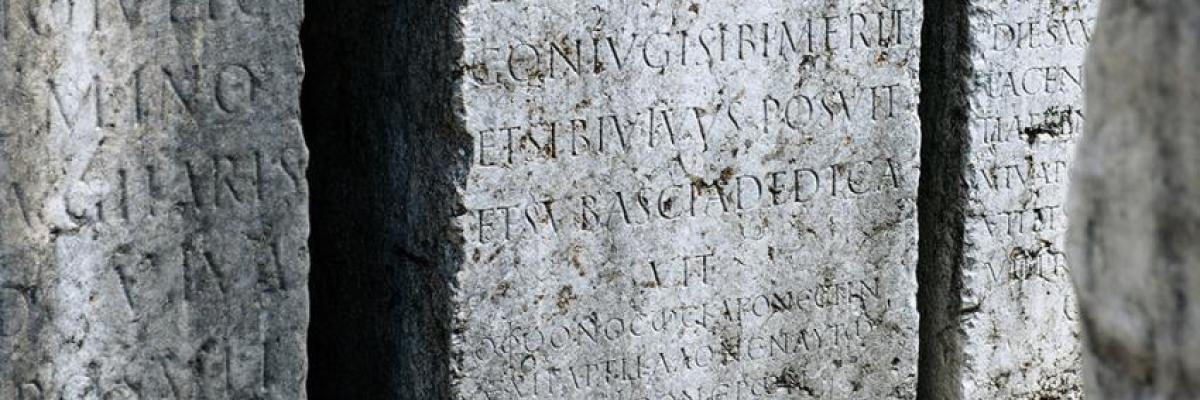
English
The Department of Classics offers a full range of undergraduate and graduate level Latin courses, from beginning Latin to Ph.D. level seminars. Elementary Latin (LATI 1010 and 1020) prepares students to read prose and poetry: Caesar and Ovid in LATI 2010, and Cicero and Catullus in LATI 2020. Students may then continue at the 3000 and 4000 levels, reading in specific authors (e.g., Vergil, Horace, Cicero) or in genres (e.g., Roman satire, Roman historians). A Distinguished Major Program is available to advanced students. We also offer an Intensive Latin course (LATI 1030) for students who want to learn basic grammar in one semester; this is often helpful for graduate students in other fields such as History, Art History, Philosophy and Medieval Studies. The Summer Latin Institute is a 12-week intensive study of Latin; students complete 1010, 1020, 2010 and 2020 in the full session and then go on to 3000 level courses. In conjunction with the Curry School of Education, the Department offers a fiveyear MT program for Classics Majors who wish to teach Latin in secondary school; these students earn both the B.A. degree in Classics and the Teaching Credential upon completion of the program.
The Major in Classics with a concentration in Latin requires six semester hours of Latin (above LATI 1020), including at least one 4000 level class; a year of Greek; Roman History (HIEU 2041); either Greek or Roman Civilization (CLAS 2010 or 2020); and two additional “related courses,” which may be chosen from courses offered by the Classics Department, such as Greek Mythology, Women and Gender in Classical Antiquity, The Age of Augustus, The Age of Cicero and other CLAS courses, or in fields related to classics, such as Philosophy, History, Art History, Medieval Studies, and Religious Studies. A Minor in Latin requires four semester courses in Latin (above Latin 1020) and Roman civilization (CLAS 2020). Majors in Classics pursue all sorts of careers after graduation: some go on to graduate school in Classics or Archaeology; some become secondary school teachers; others enter the field of antiquities conservation or museum studies. The majority of Classics majors go on to careers in Law, Medicine, business and a wide range of other professions. The Department of Classics also offers scholarship support for Classics majors to study abroad. Students interested in Latin and Italy often study in Rome and environs in the summers, or enroll in the one semester Classics program for majors at the Intercollegiate School in Rome (ICCS).
Latin is a rich, widespread and long-lived language. Beginning with the Romans, it was spoken throughout the Roman Empire, from Britain in the west, to the Euphrates in the east, from the Sahara in the south, to the Rhine in the north. During the Medieval and Renaissance periods in Europe, kings and diplomats, scholars and priests, communicated with one another in Latin no matter what their native language was. Even after it ceased to be used in diplomacy, Latin continued to be the language of science, medicine and discovery. And Latin is still in use today—it is alive and well on the Web, in the halls of the Vatican, on the radio in Finland, and at UVa. As you speak English, you might be surprised to learn that over 50% of the words we use are derived from Latin. Moreover, Latin is the ancestor of the modern Romance languages, French, Italian, Spanish, Portuguese, and Romanian. In addition to all these different facets of history, language and culture, an excellent reason for learning Latin is to read and understand fully the literature produced by Latin speaking authors from antiquity forward. Only by reading the original Latin can one fully experience and appreciate the beauty of poetry written by Vergil, Horace, Ovid and the Roman Elegists; the humor of the comic playwrights Plautus and Terence; the lively narratives of historians such as Sallust, Livy and Tacitus; the insights of philosophers, including Lucretius, Cicero, and Seneca; and the power of the political and forensic oratory of Cicero, along with the nuances of rhetorical theory as expressed by the same Cicero and by Quintilian. Last but not least are the fascinating collections of letters of Cicero, Seneca and Pliny, which give wonderful firsthand insights into the ancient world. After the Classical authors, the study of Latin gives access to many later authors, including the major theologians Augustine and Aquinas, and important humanists like Thomas More and Erasmus.